Text
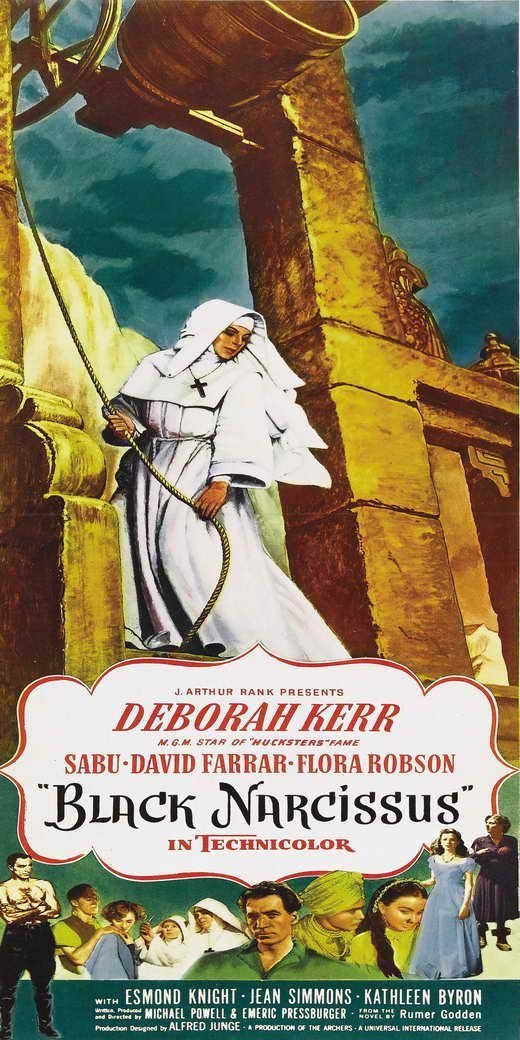
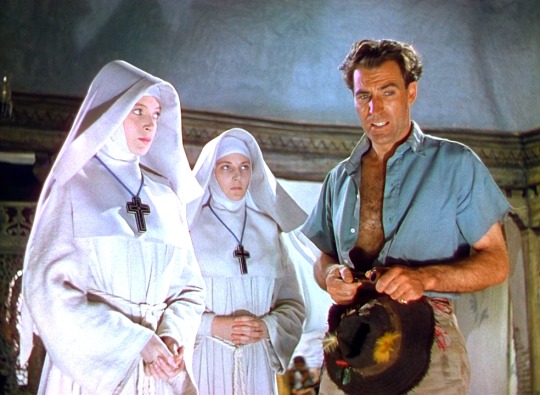
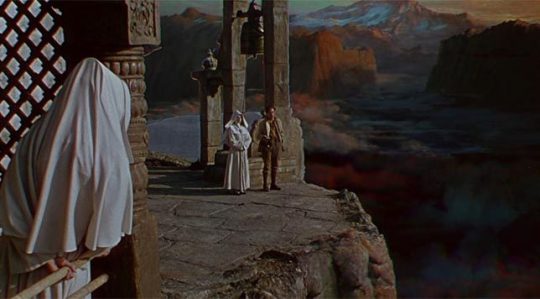
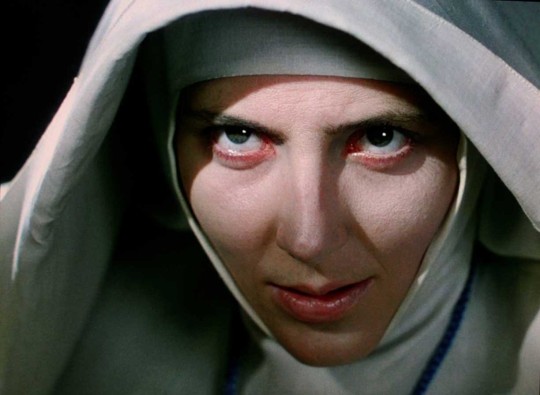
BLACK NARCISSUS (1947)
Director: Michael Powell and Emeric Pressburger
Cast: Deborah Kerr, Sabu, David Farrar, Kathleen Byron, Flora Robson, Jean Simmons, Jenny Laird, Judith Furse
Genre: psychological drama
SPOILER ALERT for this 70+ year old film!
Let me just first address one of the worst things about this movie (and a warning if you're interested in watching this): Jean Simmons in brown face. Will get back to her character, Kanchi, later.
I went into viewing this without any prior knowledge save for that it's considered a classic, and it's about nuns (I usually like to watch this way, then do some research after). So, when I realize that these nuns are about to embark on missionary work, I definitely got more tense. Like we are about to dive into very pro-colonizer nonsense? I wanted to sit through it to see just what a movie of this time might have to say. It's a hit and miss on a lot of things, but still made for a very interesting movie. I would not recommend to folks looking for a chill time, especially POC who might feel they will have to "endure" its issues.
As mentioned, these (white) nuns embark on opening a clinic and school for the local people. It's established from the beginning that they have an attitude - whether conscious of it or not - of being superior. And they get checked on it hard, never making the pivot, unlike so many other stories about missionaries or "white teachers in the hood". They don't get their savior moment, which is refreshing.
Even still, the movie still exoticizes and infantilizes the native peoples. Even Mr. Dean, who is supposedly the closest to the locals and is guiding these nuns, describes the people as children. Yes, he is an intentionally deeply flawed character. He's willing to turn a blind eye to things, gets drunk, etc. Still, that notion is never actually called into question as the natives were never given any dimension. Mr. Dean sort of embodies the movie itself, as he never actually becomes a part of the community he's existing with.
Kanchi: yikes. Even beyond the brown face there's a lot of problems with the character. She's oversexualized when viewers are first introduced to her, doing an exotic dance that lingers on for a weird amount of time. The nuns were given real flaws to grapple with that makes the viewer question why they were so entitled to this new place they are in - in line with what the movie is saying. While Kanchi's behavior is boiled down to being so naive that you should actually pity her. The implications of that for the movie is kinda gross and again, rather infantilizing. May Hallatt plays another native, Angu Ayah, at least not in brown face but her character relies on being maniacal to signify that she is a mysterious native. Perhaps it would not feel off if there was a rounded POC cast. Which an attempt was made with The Young General (Sabu) but also he was so one-dimensional, the “good” sort who would never call-out or dissent in the first place to this colonialism in the first place.
That said, I appreciate that these nuns were all deeply flawed. One of them blatantly racist which to me seemed to hilight the insidious colonizer mindset rather then excuse the behavior of the other characters as being “not as bad”. In the end, they all still worked together as “sisters”, each were in the very least complicit. They were definitely allowed to be more complex and given more range to be more subtle.
I enjoyed watching the attempts at tackling themes about religious discipline vs human desire, and especially anti-colonialism - even though it hits a wall with the latter, evidently limited by the fact that it is created by white Britons with blind spots when it comes to POC characters.
David Farrar in shorts.
1 note
·
View note
Text
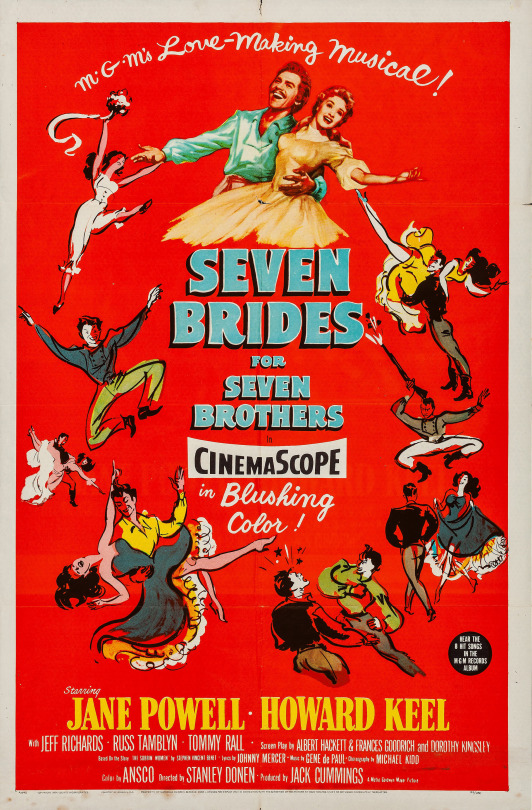
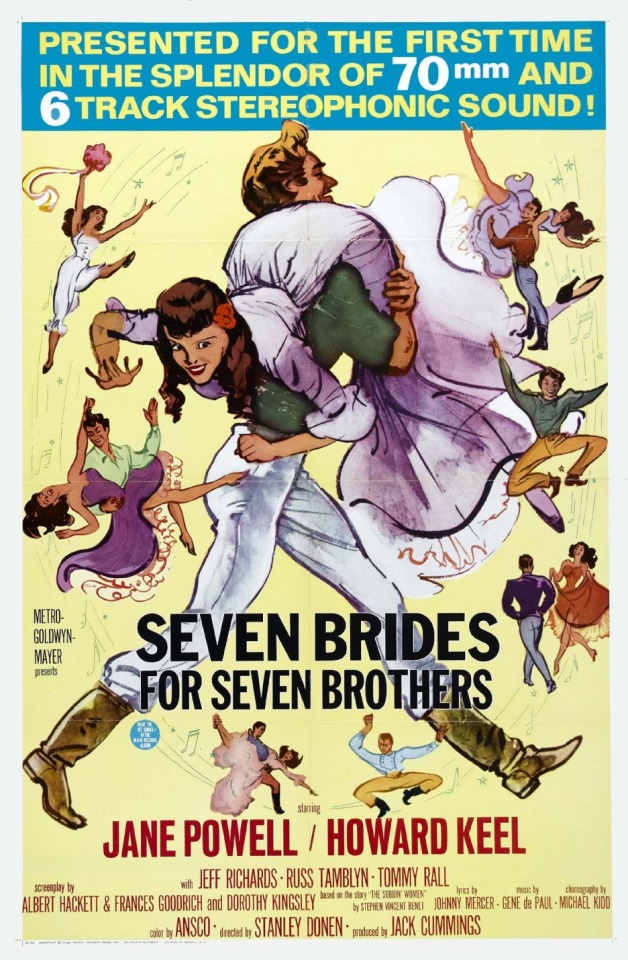
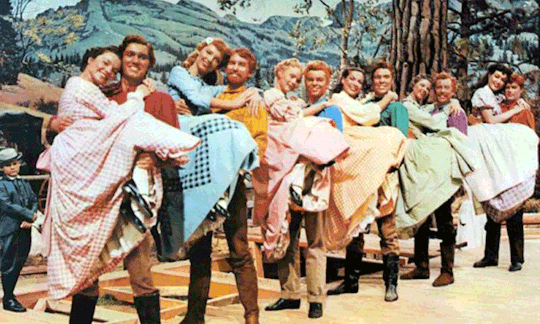
Seven Brides for Seven Brothers (1954)
Directed by: Stanley Donen
Starring: Jane Powell, Howard Keel, Jeff Richards, Julie Newmar, Matt Mattox, Ruta Lee, Marc Platt, Norma Doggett, Jacques d'Amboise, Virginia Gibson, Tommy Rall, Betty Carr, Russ Tamblyn, Nancy Kilgas
Genre: musical, comedy
Six brothers go to town to find wives after their eldest brother gets married.
Warning- so much misogyny!
I watched this movie July '22 and my head was spinning. I can't describe what I was feeling - I was laughing so hard at what I was seeing though certainly not for the intended reasons. I can't say I was totally surprised, because of where the story started and seemed to be leading. Still, I hoped by the time the kidnapping happened things would turn around but I was still baffled. I was yelling at my screen, "Oh please, don't - you aren't seriously going to-! Oh my god, you are! no, NO, NOOOoooO!" I remember feeling like, "damn, I really wish someone was watching this with me", and they could feel as ridiculous as I was feeling. I was gonna put this movie out of my memory because even sharing about it to friends the vibe I generally got back was, "...and you watch this shit?"
DomoDraperr@tiktok watches Seven Brides for Seven Brothers pt. 3
Saw the reaction above (love his 'Watching [_] being uncomfortable but not knowing why' series) and I was crying laughing. So yes, memories came flooding back. And here we are.
Yep, a bunch of brothers kidnap several women. Milly condemns it, and the movie itself sort of says it was a bad thing but only so far as, "boys will be boys" you know what I mean? And all the girls forgive and marry them by the end. This wasn't a few awkward comments; they kidnapped several women and even clobbered one of their suitors. Even though the lead male character, Adam (played by Howard Keel), finally learns what he did was wrong, it was in that typical "if it were my daughter-~" reasoning. Not so much as you shouldn't be taking away the agency of another human being. ... progress, I guess? ...
This movie was a surprise success at the time - as MGM was putting their money on Brigadoon. Critic reviews were positive, it was the 5th most popular film at British box office in 1955, AFI in 2001 ranked it #21 on a list for best musicals, and so on. Yes, quick wiki summary for you and the point is: a movie about a bunch of brothers kidnapping women wasn't controversial. Leading into my other point about how audiences were walking out on Sylvia Scarlett (1935) for a bit of "crossdressing" and more recently with Rope (1948) being banned in some cities for being too gay (without ever directly referencing to homosexuality). I think that pretty much sums up US' priorities right now too.
This movie was based on a short story by Stephen Vincent Benet, "The Sobbin' Women", which itself was based on "The Rape of the Sabine Women" myth.
Anyhow, I'm not saying you can't enjoy it or you should feel bad if you do (let's just not try to pretend it isn't what it is). The music about the sobbing women is pretty damn catchy, if I'm being begrudgingly honest. The dancing is fun - even one rare negative contemporary review would admit. And another in '85 describes it as "profoundly sexist and eminently hummable".
I was definitely entertained - eyes wide open the whole way through. Whether it's for the right reasons or not, whether the 'right' reasons matter... up to you if you wanna see for yourself.
McSweeney's Seven Brides for Seven Brothers Explainer by Devorah Blachor (2020)
7 notes
·
View notes
Text
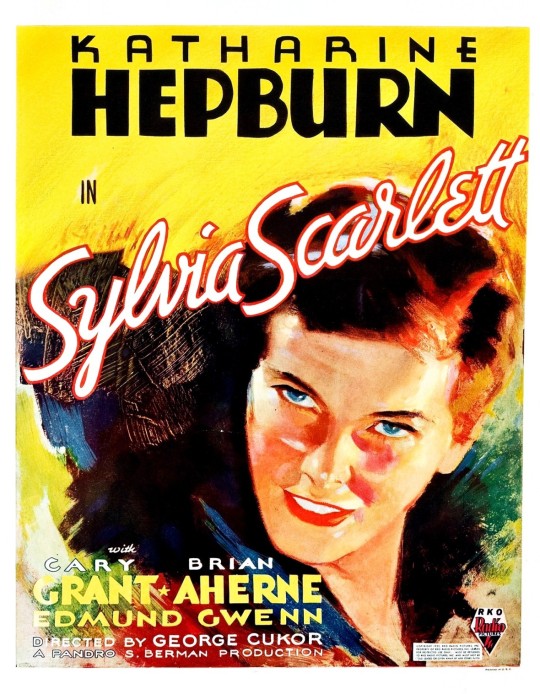
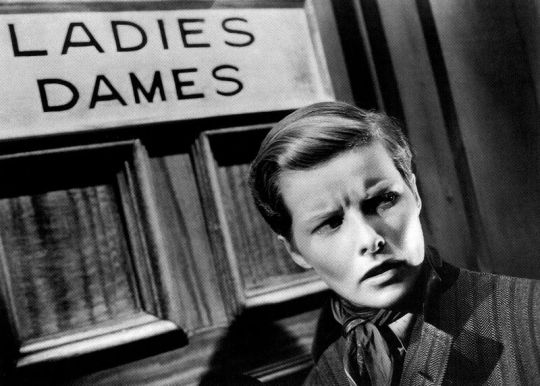
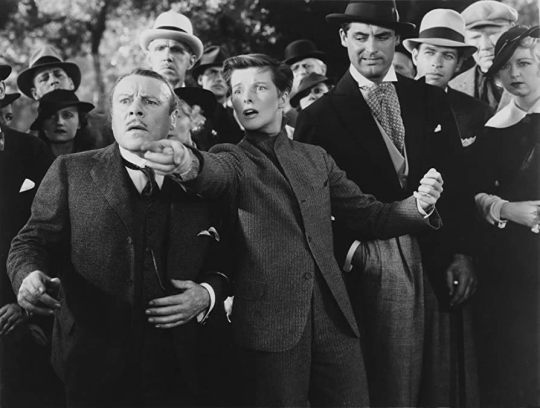
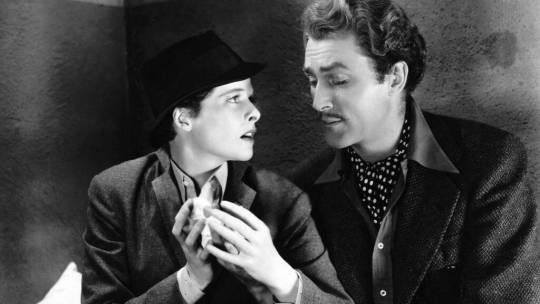
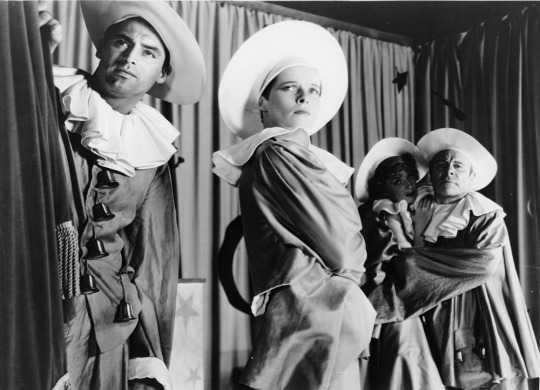
SYLVIA SCARLETT (1935)
Director: George Cukor
Cast: Katharine Hepburn, Cary Grant, Brian Aherne, Edmund Gwenn, Dennie Moore, Natalie Paley
A young girl disguises as a boy in order to escape the police.
This is one of my favorite movies. Which is pretty hilarious because this movie was completely panned when it came out and it actually lost $363,000. Katharine Hepburn, asked producers to destroy the film and offered to do another movie for free. Director George Cukor would never be hired at RKO again. Wild!!
This movie is credited as the start of Katharine becoming "box office poison". Hepburn would later say you'd have to have something wrong with you to love this movie. I don't disagree as there's something seriously wrong with me.
Didn't learn this until recently but blew my mind - this movie is adapted from a novel published in 1918. Imagine how ahead of its time this story was then, when it was still considered so in 1935! This makes it all the more important to remember that many of the terms we would use to describe anything around gender and sexuality today, didn't exist then. Concepts of sex, gender, sexuality where not distinctly defined from one another. Which all affects how you might code a character: who prefers the same sex and/or does not conform to gender.
A TCM article confirms that the movie's "sexual politics were ahead of its time". For example, Hepburn's character continues to dress in men's clothes even after the character didn't have to any longer completely. That utterly confused audiences at the time. Audiences would also walk out when it showed that both male and female characters were attracted to Hepburn's character.
I re-watched this with someone unfamiliar with older movies and they saw Michael Fane (played by Brian Aherne) as "negging" Scarlett's character. However, Fane's whining and criticisms towards Scarlett was not intended to get her interested in him (like toxic and goofy-ass dating "experts" would advise). If intentions didn't matter and it's just about slinging insults - any enemy to lovers trope would fall under negging. But then the context comes in...
With added context, Fane was actually interested in Sylvester and initially loses interest in them as Sylvia. It was almost night and day on first meeting "Sylvester" versus "Sylvia". His spiel on women was to indicate his past experience with Lily which he is unjustifiably attributing to all women. Beyond that, it also characterizes his disinterest in women, which is in opposition to what he is supposed to feel as a man. Thus he reluctantly chases Lily (the one who embodies the feminine ideal), yet never Sylvia despite Fane having been real keen when they were Sylvester. Note that he also starts to warm back up to Sylvia in men's clothes! And both characters on their escapade begin to realize they are more compatible with each other (versus the conman Monkley or the manipulative Lily). Imagine the audience reaction at the time - though you don't have to try so hard as there were plenty of written feedback (featured in the last link).
This is only half-baked in my mind at the moment but I think Monkley and Lily may both loosely represent what their respective sexes should be to a toxic extreme. While Fane is stuck in jail with Sylv he realizes their kindness and gushes over Sylv (yup, in men’s wear). “Clumsy, impetuous, generous, warm-hearted fool...” Meanwhile, Monkley realizes Lily is perfect for him because they are both terrible and lets Fane and Sylv run off. The message, to me, becomes about finding someone who shares the same values you do rather than the ideal "man" or "woman"!
This gets pretty dark for a comedy, specifically the side story about Scarlett's father. So general warning for that!
The "French" makes me wheeze with laughter every time I hear it. It's pure gibberish, with no attempt of forming an actual sentence in French.
This movie would later inspire the musical comedy Victor/Victoria (1982) starring Julie Andrews.
TCM Comments on Sylvia Scarlett (1935)
"The Men Who Made the Movies" portion with George Cukor on 'Sylvia Scarlett'
"A Woman's Lot" portion with Katharine Heburn talking about 'Sylvia Scarlett'
10 notes
·
View notes
Text
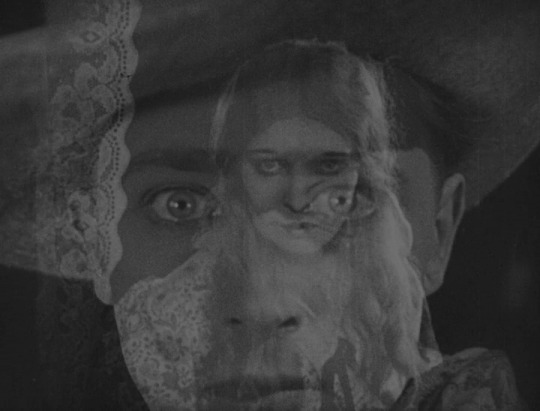
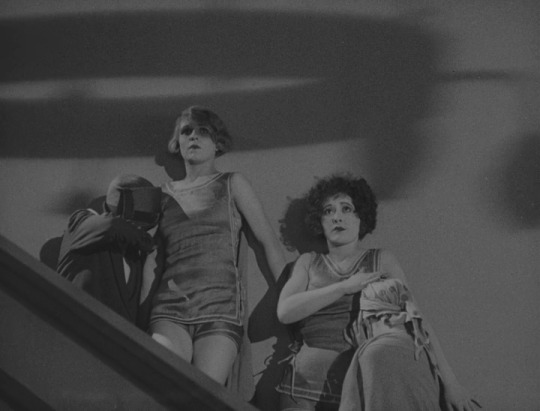

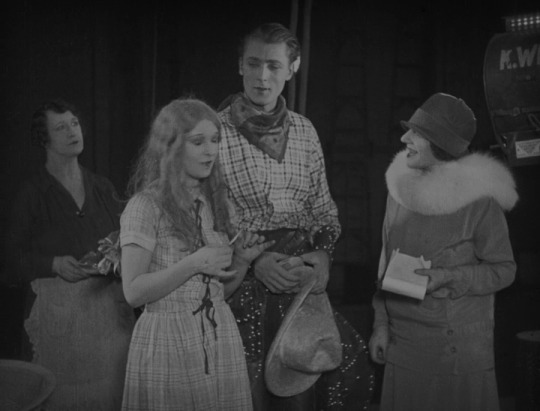
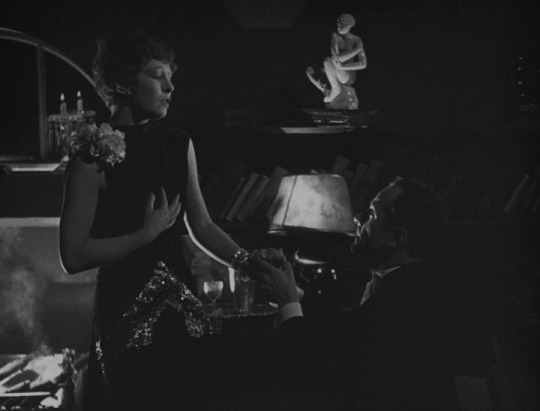
SHOOTING STARS (1927)
Director: Anthony Asquith and A.V. Bramble
Cast: Annette Benson, Brian Aherne, Donald Calthrop
An actress wants to leave her leading man for the comedian.
Technically my first silent film. This was such a gorgeously repaired copy too. I decided to dive into this one because I really liked Brian Aherne's other talkie movies. When I saw some clips from this they were hypnotizing, dramatic, and stark - I had to give this one a watch.
What I didn't see on clips were just as gorgeous. Like when Mae (played by Annette Benson) meets Andy (played by Donald Calthrop) at his place. What you don't say with cards or words is depicted visually. It's so dark and moody since this is a secret affair, and you want to remind the viewers that this relationship only happens because of the lying and sneaking.
The "ragdoll" scene had me cracking up but hey, old movies for you. Get over that and you are able to appreciate the drama in the shots following. The intense shadows amplify the gravity of Mae's actions. The composition in them would make for awesome reference.
I like that this affair wasn't the girl going for the hunk (or the "alpha" in today's vernacular). Kind of reversal of expectations. She got the superstar, the handsome heart-throb actor. It's the guy she's supposed to want and marry but he bores the shit out of her, and she goes for the struggling comedian for some excitement.
This one is recommended if you want to get an idea of what it's like behind the scenes of a 1920s studio. The biggest thing that pops up in my head the reveal of the mat painting.
Didn't know this until recently but the movie credit went to veteran filmmaker A.V. Bramble but it's acknowledged that this was Anthony Asquith's directorial debut as he wrote the original story, along with his hands in a bunch of other things to create this film.
0 notes
Text
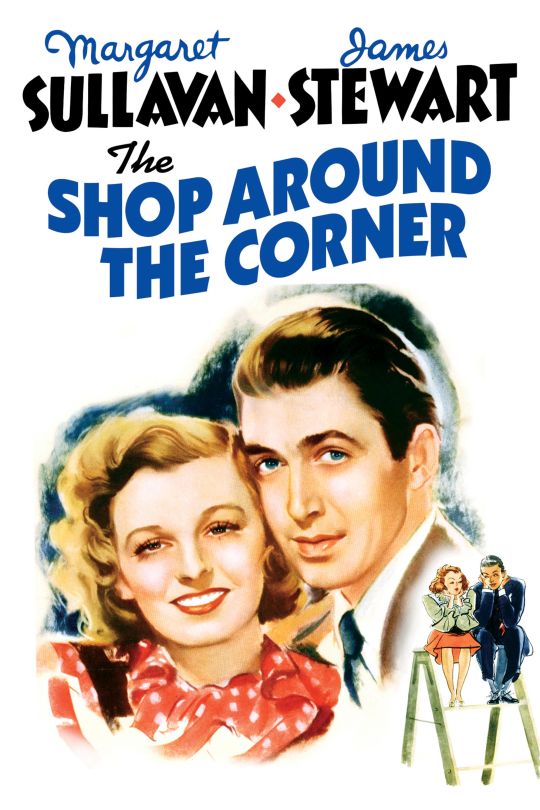
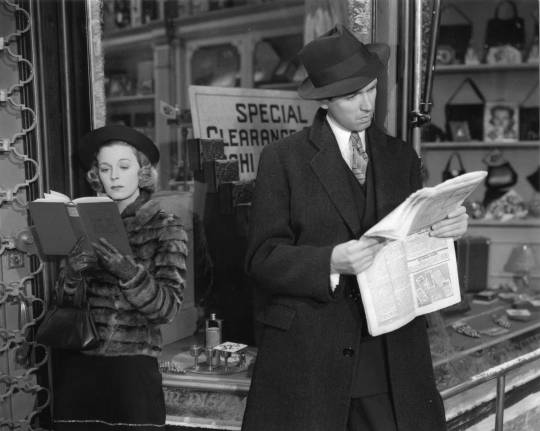
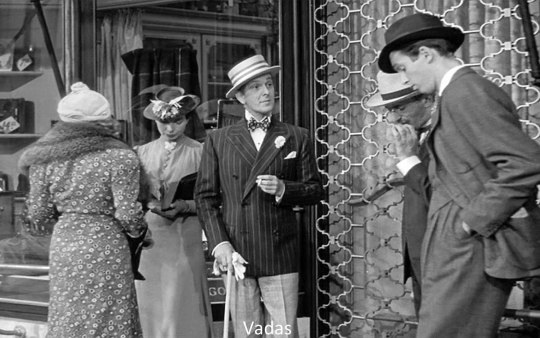
THE SHOP AROUND THE CORNER (1940)
Director: Ernst Lubitsch
Cast: Margaret Sullivan, James Stewart. Frank Morgan, Felix Bressart, William Tracy, Joseph Schildkraut
Genre: romantic comedy
Two employees at a general store are constantly butting heads while being enamored of their respective pen pals.
This movie started me on the path to watching older movies. Back when we had cable, I was literally just flipping through the channels looking for something to watch and there was something super charming about this black and white movie that made me stop. I'm pretty sure it was James Stewart's demeanor in this movie. I would binge a bunch of his other movies after - including The Mortal Storm which stars him and Margaret Sullivan again as its romantic leads.
The fact that this movie is considered a top tier romcom is validating. And of course, because Hollywood is gonna Hollywood... it would be later adapted into "You Got Mail" starring Tom Hanks and Meg Ryan. This time with AOL inboxes instead of a PO box. I believe it's considered a 90s romcom classic but I'm partial to The Shop Around the Corner because of the shop atmosphere. And that both of the main characters are from humble beginnings (and not part of a mega bookstore chain, yanno?).
I think it's a well-done "enemies to lovers" trope because they never get too nasty with each other just for the sake of some drama or to delay the romance. And when they get real snarky, it makes it hit harder. When Klara tells him he has a hand-bag instead of a heart (because he's the shop assistant and takes his job seriously) that bit of dialogue was brutal.
Miscommunication and misunderstandings are typical romcom fare, but I feel like Shop doesn't rely on it as much as '90s romcoms. I feel like they've essentially just dismissed each other based on first meeting, in a work environment (which is an important note), so it took some time to realize the qualities in each other that actually matter. And what misunderstandings occur was pretty much intentional on Kralik's part and was incredibly amusing.
The ankle scene! Haha. Burned into my memories and makes me wish for a pair of sock garters of my own.
Because of its genre, the viewer knows it's going to deliver a happy ending where the leads get together but watching them warm up to each other is satisfying. It doesn't feel predictable because of its attention to details.
Beyond the main characters, the supporting cast is great. The shop is lively, it's not overly idealized and syrupy. I do like the friendship between Pirovitch (played by Felix Bressart) though. Hugo Matuschek, the shop owner (played by Frank Morgan), goes hot and cold on his employees due to personal things at home. As much as I will say on that without spoiling things. Let's not forget the brown-nosing co-worker Ferencz Vadas (played by Joseph Schildkraut). His lines are perfectly two-faced or backhanded. Like you're so sure he insulted you, but you can't call him out on it! With that you got your set up for a workplace comedy-drama.
Interesting bit: Margaret Sullivan and James Stewart were friends off screen which probably helped the on-screen chemistry. It's also believed that Stewart was head over heels for Sullivan. She was married to Henry Fonda and the three were all pals (though they divorced years prior to this movie). She and Fonda were lefties while Stewart was a republican. So that dynamic is definitely interesting. I don't remember the source, but supposedly Fonda and Stewart had such a heated argument once that they had to swear off talking politics! Sullivan herself was also known for getting pretty heated. When she heard that a writer was gonna get fired because of his left-wing views by an anti-communist director, she blew up on said director. Even one of the founders of MGM was scared of her. Her life was rough going as she got older, pretty tragic. But I won't get into that here.
"You treated me like a dog." "Yes, but instead of licking my hand, you barked."
"There might be a lot we don't know about each other. You know, people seldom go to the trouble of scratching the surface of things to find the inner truth.”
6 notes
·
View notes
Text
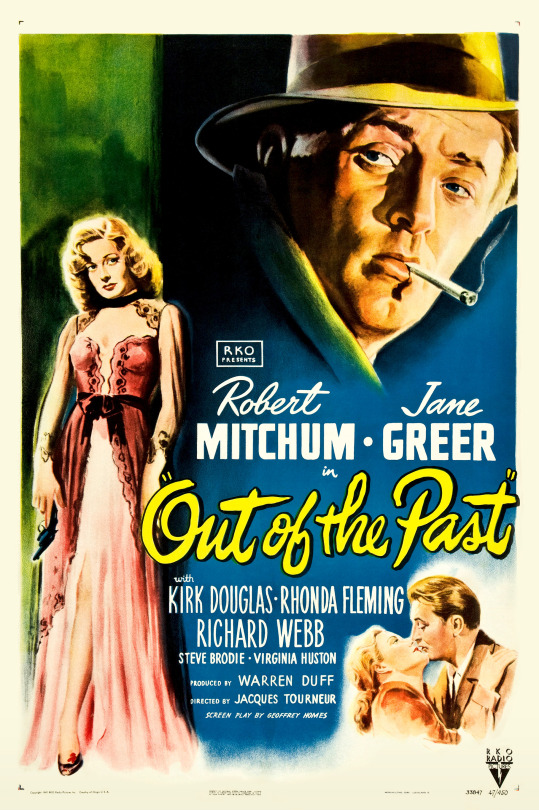
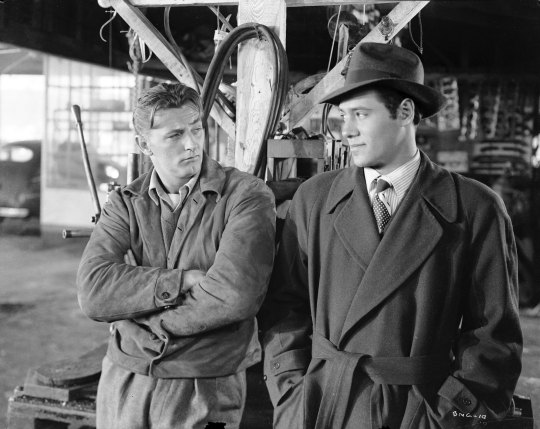
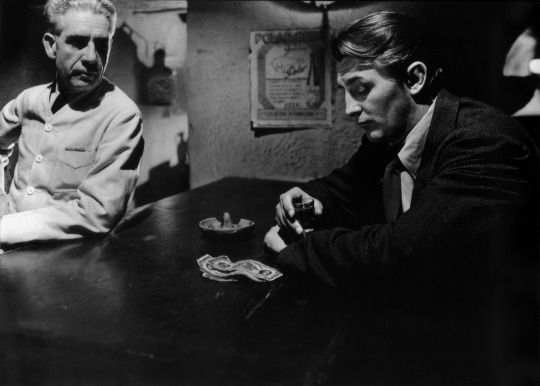
OUT OF THE PAST (1947)
Director: Jacques Tourneur Cast: Robert Mitchum, Kirk Douglas, Jane Greer, Virginia Huston Genre: noir
Gas station owner's quiet life is interrupted when tracked down by a shady character from his past.
A very classic noir where no bad deed goes unpunished, including those of our protagonist, I suppose for having ever associated with these shady characters. Even if that's a Hays code standard, that was the only way this movie would have turned out.
You also have the just-as classic femme fatale. These things combined and it's easy to see why it's considered one of the ultimate noir films!
Mitchum plays reluctant anti-hero. I think he does a great job of the gruff and aloof type of character. This is the sort of character I typically associate with him.
The Kid is a fun support character. I'm not saying he's perfect representation for deaf and mute person. A character with disabilities is typically used to signify something about the other characters around them (unfortunately). Like how Mitchum's character treats him versus the old colleague that pops back up. Even though they are one-dimensional (and same goes for the other support cast) they are at least given some dignity. BUT best of all is that iconic fishing rod scene, haha.
"I think I'm in a frame...I don't know. All I can see is the frame. I'm going in there now to look at the picture."
#out of the past (1947)#jacques tourneur#robert mitchum#kirk douglas#jane greer#virginia huston#noir#crime
1 note
·
View note
Text
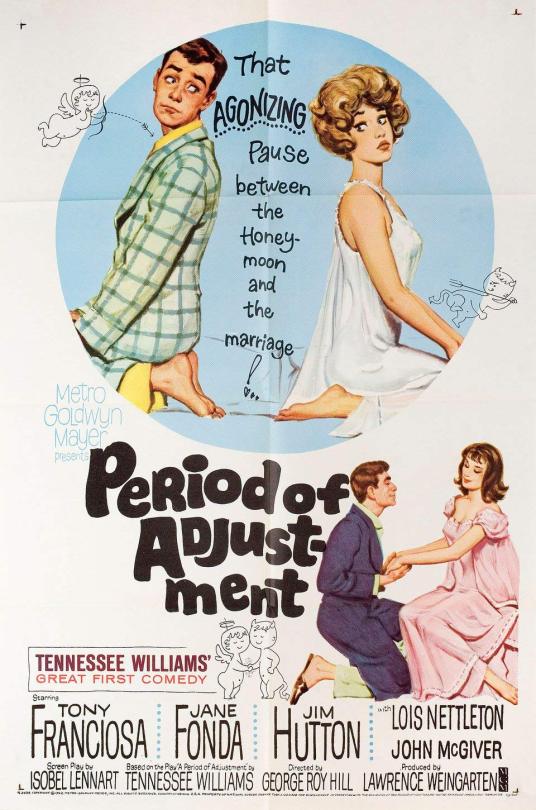
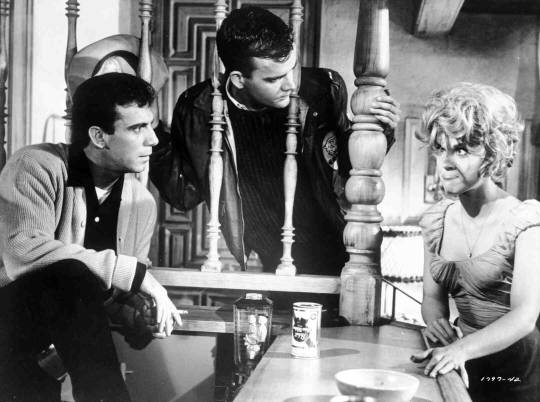
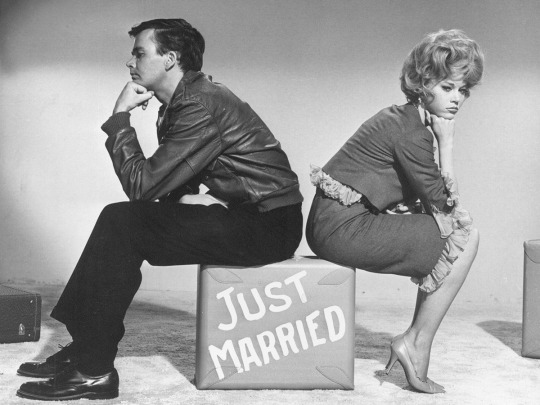
PERIOD OF ADJUSTMENT (1962)
Director: George Roy Hill
Playwright: Tennessee Williams
Cast: Jane Fonda, Jim Hutton, Anthony Franciosa, Lois Nettleton
Genre: comedy drama
A newlywed couple visits a friend with marital problems of their own.
I'm a sucker for Tennessee Williams plays and a comedy was rare from him. A lot of them have to do with masculinity, what makes a man, or a good man. And of course, because of the times, women's dependence on men. This one definitely fits in with that, even as a comedy.
The biggest negative: Jim Hutton’s character, George Haverstick, is shown as redeemed without having done substantial work to change when he was an utter misogynist. It wraps things up in Hollywood fashion by suggesting the start of his perspective shifting. I feel like this was more of a time-saving thing. You're left to assume he does the work.
The biggest BUT in regard to that: The movie made great points and did not try to say his behavior was acceptable. There's no "boys will be boys" shtick here. It's focus was on calling out these behaviors and I think it did a good job of doing that and keeping things entertaining.
Even if the George Haverstick character would not fly now (I think audiences would ask more of him especially by the end), I think it’s potentially worth a watch to see what notions were around and what were becoming mainstream.
I find it so funny that they keep saying that Lois Nettleton's character is homely. At some points they even have to say, "she used to be!" you know, not any more! And it's an interesting move to make Ralph Baitz (Tony Franciosa) originally marry for money instead of love. And that he learned to appreciate his wife's qualities and sincerely love her. However, I think they could have maybe done a better job on that.
Not subtle but a great portrait of how toxic masculinity shits on people, the toxic guy himself included.
You will yell at the screen over how much of an ass George Haverstick is. Definitely empathized with Jane Fonda’s character.
The biggest pro: seeing a man check another man. Anthony Franciosa’s monologues as Ralph Baitz are my favorites. It makes the movie - I would not feel how I do about it if were cut.
"I know one thing. I know any guy that goes through life telling himself and everybody else he's Superman, boy, has GOT to shake. 'Cause there is NO Superman. He's just a character in the funny papers. That's all, George. And you're better than that, boy. You're REAL. It's alright to have needs and weaknesses."
"What an awful, frightening thing it is. Two people living together just... two completely different worlds. Attempting existence together."
#period of adjustment (1962)#george roy hill#tennessee williams#tony franciosa#jane fonda#jim hutton#lois nettleton#comedy
1 note
·
View note
Text
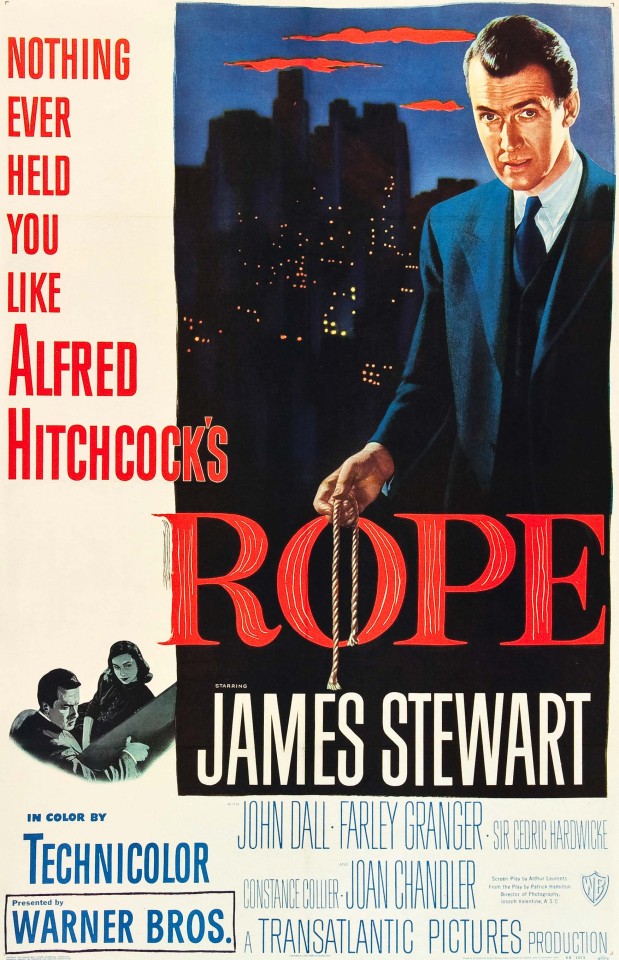
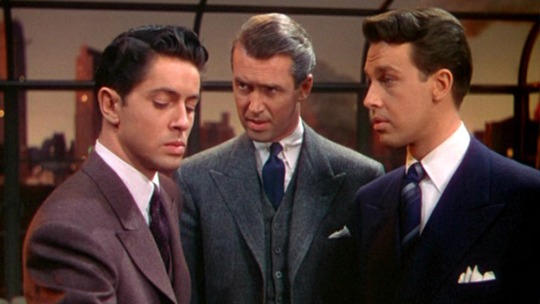
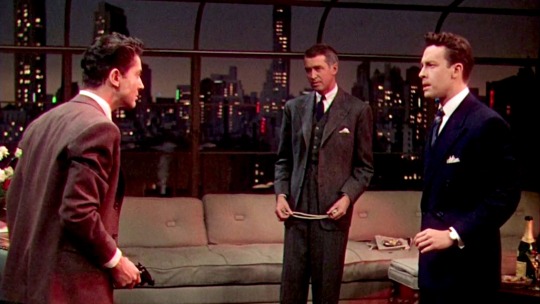
ROPE (1948)
Director: Alfred Hitchcock
Screenwriter: Arthur Laurents
Cast: James Stewart, John Dall, Farley Granger
Genre: psychological crime thriller
Two friends murder their former classmate as an intellectual exercise.
One of my favorite Hitchcock films. Both in part of what's on screen and the behind the scenes: what went into making this movie, its LGBTQ+ casting, and its monologue.
I'm down for any theme that's about reality checking people with superiority complexes.
The original play was likely based on the real-life murder of a 14 year old by two students who believed they could commit the "perfect crime".
Known for its technical feat with its long shots, creatively masking the cuts in order to change out the reels. I'm simplifying here, but it's worth looking into in order to appreciate. Also Hitchcock's first technicolor movie.
The movie didn't do well in its time. The studio distanced from the movie because of its overt queer context. It was banned in some locations and received a Mature rating.
Didn't know this before watching Matt Baume's video the fact but James Stewart's character, Rupert Cadell, was originally gay and it would have been rad to see a more queer-coded character! Like as much as I love James Stewart, it's unfortunate he couldn't pull it off. But it's great to know now that-that was how it's meant to be in the original play and what Hitchcock had intended (Stewart was not his first choice)! Mind-blown.
Along with that, it's always fascinating to know what the Hays code was obsessed with, and what they missed for any movie. It also just gets my gears turning because I feel like audiences now would miss these innuendos too, now that writers and directors don't have to rely on them. And with Rope in particular, as mentioned the studio bowed out because of this. And the audiences were like, "THIS IS GAY! THIS IS VERY GAY!" and had it banned in some places. But a fear years ago I was watching this with a straight friend, they had no idea there was any gay subtext.
"The Secret Gay Love Affair Behind Alfred Hitchcock's Rope" Matt Baume, 2023
"Rope Needs More Gay", Rantasmo, 2016
Again, because of the re-writes, the casting, the fact that Rupert Cadell reads as straight, it could easily read as condemning gay people as being inherently evil and murderers. But yeah, I just never watched it with that lens even without knowing Cadell was straight. Many people did view it that way though (Rantasmo) but with Baume's research I think the next time I watch it, I will appreciate it further.
And to be honest, everyone reads Stewart as straight or sexless but not me, at least not for his roles. And I think it's because I saw some trash tabloid talking how he and Henry Fonda were totally boyfriends because they lived together when they were unknown and broke as shit, even slept in the same bed. While that is true that they lived together - there's no such thing as roommates anymore? They were best friends the rest of their lives, but as far as the "lovers" thing that didn't really have any evidence. That's with being fully aware that Hollywood likes to keep secrets. But not even a single hearsay from people behind the scenes...
Also, if Cadell's character was actually read as queer, maybe Hoover wouldn't have felt this about the movie? Because what the hell? haha.
"I mean that tonight you've made me ashamed of every concept I ever had of superior or inferior beings. But I thank you for that shame, because now O know that we are each of us a separate human being, Brandon. With the right to live and work and think as individuals, but with an obligation to the society we live in. By what right do you dare say that there's a superior few to which you belong? By what right did you dare decide that, that boy in there was inferior and therefore could be killed? Did you think you were God, Brandon? Is that what you thought when you choked the life out of him? Is that what you thought when you served food from his grave? I don't know what you thought or what you are, but I know what you've done. You've murdered! You've strangled the life out of another fellow human being who could live and love as you never could - and never will again."
4 notes
·
View notes
Text
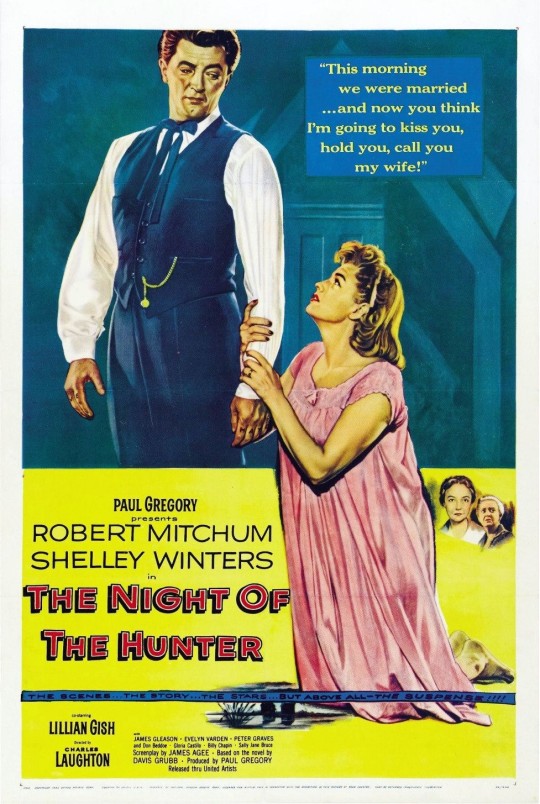
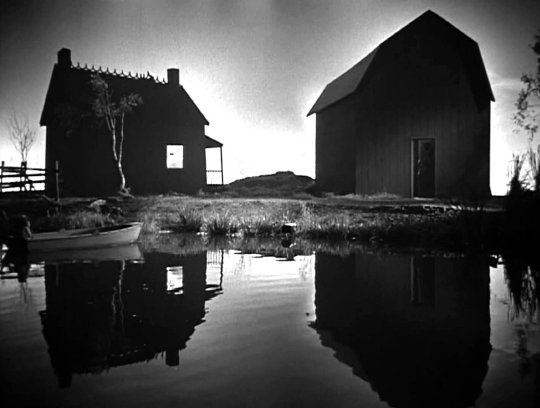
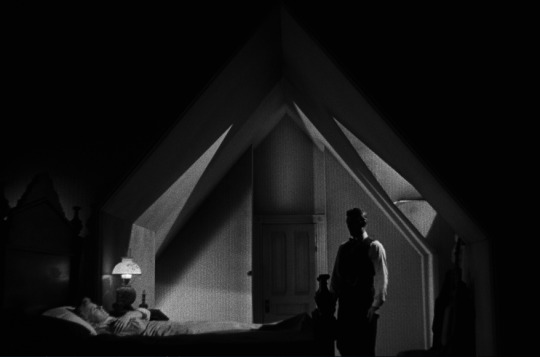
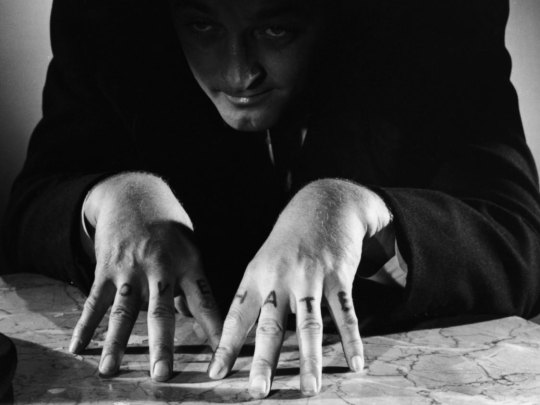

NIGHT OF THE HUNTER (1955)
Director: Charles Laughton
Cast: Robert Mitchum, Shelley Winters, Lillian Gish, Billy Chapin
Genre: noir thriller
A fake reverend tries to get his hands on $10,000 in stolen bank money from the wife and children of the executed robber.
The story was inspired by true story where a man was hanged for the murder of two widows and three children. I appreciate that it is inspired by and not some insensitive true crime flick. And what was changed was absolutely intentional and for the story.
One big change is making the antagonist Harry Powell a “preacher” - someone who can sway people with ease as even though he spews absolute nonsense. Everyone just eats it up! But I think it's important that he's not just some conman but he is actually deeply religious. Laughton originally wanted him to be an actual preacher (rather than an imposter) but the censors put a stop to that.
I was familiar with Mitchum in hero (anti-hero) roles at the time I watched this, but he did a fantastic job as the frightening and intimidating villain. He considered this his best role.
I'm a simpleton so I love Lillian Gish here - this old woman with a shotgun, protecting the kids. That alone is just iconic. But her character, what she represents, is a crucial contrast to Mitchum's. While Mitchum uses his believes to manipulate and hate (he would be all to happy to facilitate murders of women he deemed sinners), Lillian Gish's character was was understanding - in a way that she did not put herself above even the kids she was caring for. Really moving to see.
Billy Chapin was also great in this movie. Heart breaking to see a kid having to grow up quick and constantly dragging his little sister away from danger. That ending, especially, when his traumas overwhelm him.
Loved the German expressionist visual style. Really amplified the sense of uneasiness and fears that the kids have. Like it's how they perceive this nightmarish world?
Being set during the depression made complete sense. Kids often left home and were without parents. I suppose we take it for granted but let’s remember this fact along with the lack of laws against child labor. The notion that children are actually little humans that absorbed everything like sponges, are vulnerable or susceptible to their environment - was not necessarily a given.
This movie was panned on original release. Laughton would never even attempt to direct another movie. However, decades later, it is now considered one of the greatest films ever.
#night of the hunter (1955)#charles laughton#robert mitchum#shelley winters#lillian gish#billy chapin#noir#thriller#crime
8 notes
·
View notes